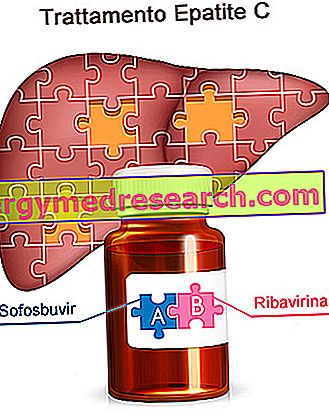Care and treatment
The choice of the most suitable treatment is taken after evaluating the results of diagnostic tests. If these indicate a low level of abnormalities, while continuing to monitor the evolution of hepatitis, the doctor may decide not to intervene, because the risk of developing severe liver damage is low; on the other hand, due to the side effects of specific hepatitis C treatment, taking therapy may cause more harm than good. At the limit, the doctor can direct the patient towards hepatitis A and hepatitis B vaccination, since the simultaneous association of these diseases greatly increases the rate of liver degeneration.

Effectiveness of New Treatments
Hepatitis C therapy has made significant progress in recent years, so much so that the success of an aggressive treatment is around 80% for people with certain genotypes and 50-60% of all treated individuals. At the beginning of 2014, a new drug, Sofosbuvir (eg Sovaldi ®) was introduced, which is even more effective, as it is capable of guaranteeing healing in more than 90% of patients affected by hepatitis virus genotypes 1, 4, 5 or 6 C. Sofosbuvir treatment is also based on the combination with ribavirin and possibly with peginterferon.
The traditional treatment consists in weekly subcutaneous injections of a drug called pegylated interferon alpha (peginterferon), in association with a double daily intake, orally, of a second medicine, called ribavirin. The duration and pattern of treatment may vary depending on the genotype of the virus involved in the infection; on average it goes from 24 weeks at high dosage (more suitable for genotype 1), to 48 weeks at lower dosages (more suitable for genotype 2 and 3).
If the treatment does not produce the desired effects, it is possible to proceed with a second cycle, in such a way as to weaken the virus or completely eradicate it.
To learn more: Drugs for the treatment of hepatitis C
Side Effects of Treatment
Side effects associated with interferon / ribivarin therapy include:
- severe flu-like symptoms, irritability, depression, difficulty concentrating, memory impairment, skin irritation, fatigue and insomnia (attributable to interferon)
- anemia, pruritus, nasal congestion, dermatitis, fatigue and changes or alterations of the normal development of the fetus (attributable to the ribivarina)
- suicidal behaviors and thoughts have been recorded in a small percentage of people (due to the simultaneous use of the two drugs).
Although the side effects may be mitigated by the simultaneous intake of painkillers and antidepressants, sometimes they are so severe that they require discontinuation of the treatment or reduction in the dosage of interferon.
For the same reason, the treatment of hepatitis C, as just described, is contraindicated or is performed at lower dosages and / or for short periods, in people suffering from depression, anemia, autoimmune diseases, in alcoholics and pregnant women.
If hepatitis C is diagnosed at an advanced stage, when the liver has major and irreversible lesions that seriously compromise its functionality, the best treatment is organ transplantation.
Diet, supplements and lifestyle
After having diagnosed hepatitis C and planned an appropriate treatment, the doctor will advise the adoption of a healthy diet, aimed above all at the definitive removal of alcoholic beverages (ethanol accelerates the development of the disease); less fries, less chocolate and coffee, less fastfood, smaller meals, but richer in fruit, vegetables and whole grains.
On the other hand, in the presence of hepatitis C, it is essential to avoid the use of hepatolytic drugs, such as paracetamol. Some supplements, such as artichoke extracts, milk thistle and silymarin, provide important help, thanks to their ability to cleanse the liver of toxins and improve its functionality. Their use in the presence of hepatitis C must however take place under medical supervision, since, a bit like all phytotherapeutic products, they are contraindicated in the presence of certain diseases and could interact with some drugs prescribed to the patient.



